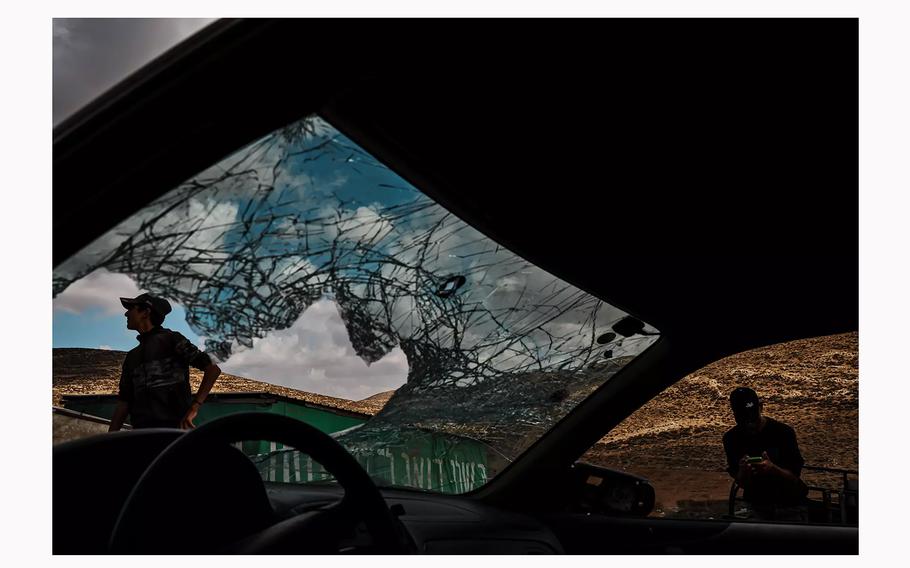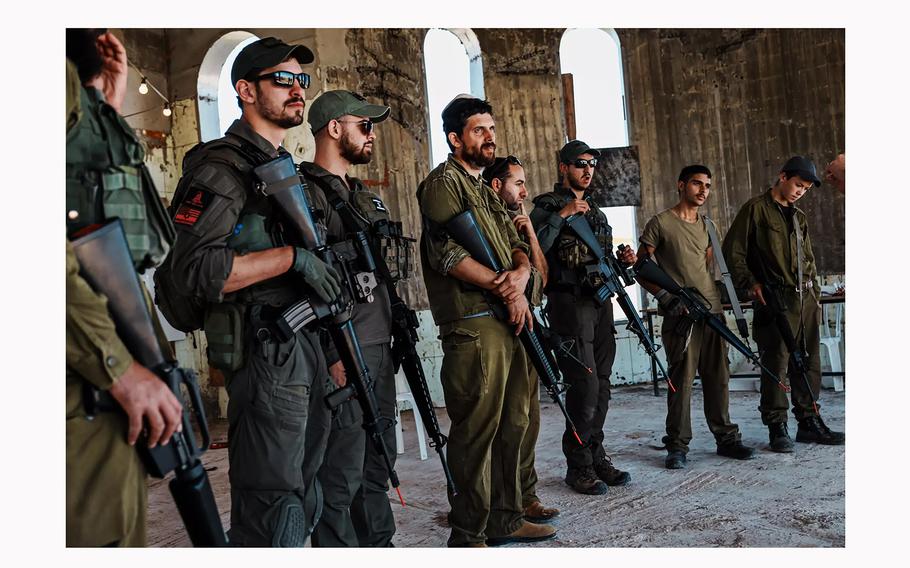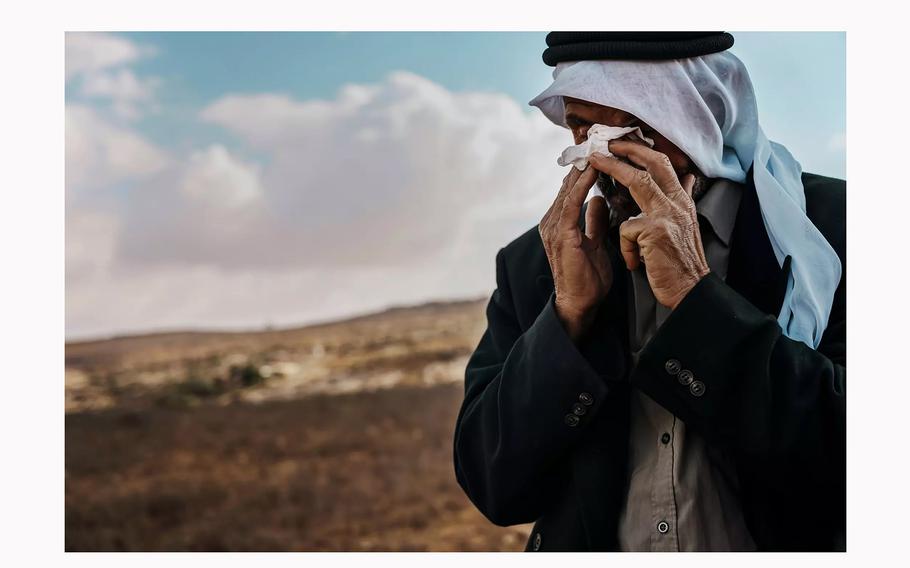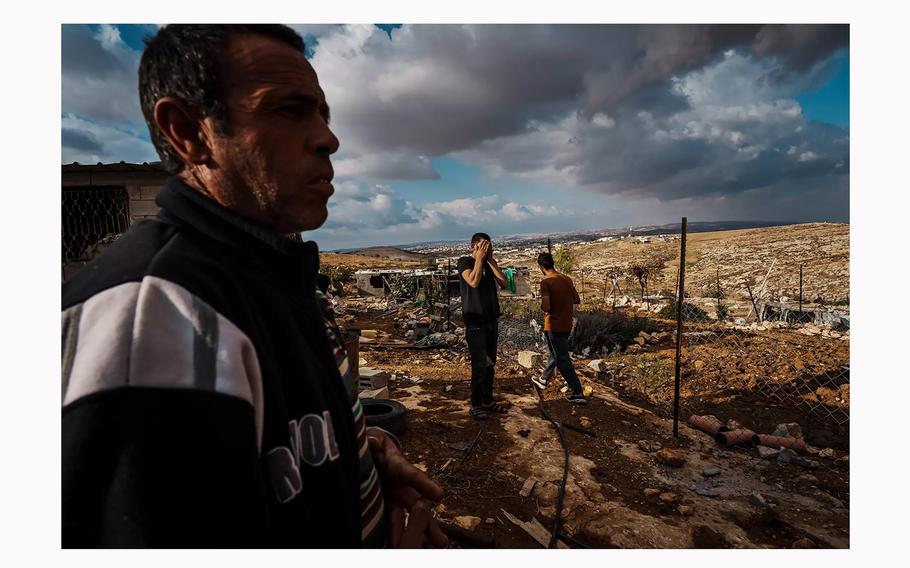
Palestinian boys inspect the windshield of a vehicle that was damaged by Jewish settlers who stoned it in Wadi Tiran in the occupied West Bank. (Marcus Yam/Los Angeles Times/TNS)
(Tribune News Service) — Jibreen Abu Aram was born on this rocky land to be a shepherd. He planted an olive grove, married and had nine children. He buried his brother here in 1966 after an Israeli tank round fell on their fields. But, he said, nothing in all his time in the West Bank has tormented him as much as the Jewish settlers who over the years have beaten him, poisoned his sheep, kept him from harvesting his olives, buzzed him with drones and threatened to kill his family.
He pointed to a figure in the distance, a settler who was grazing sheep on his land. Aram called the police. They arrived, but nothing was done. Aram was not surprised. Settlers had earlier chased him from his home and stole his smartphones. “I haven’t slept there since the war began.” he said. “I’m too scared. We do shifts through the night to keep watch in case the settlers come for us.”
Aram braced against a cold wind. His friend, Taleb Mohammed Ahmad Neeman, sat on a rock yelling and gesturing at the settler. “We are surrounded,” he said. “They use our land whenever they want. They come in uniforms so you can’t tell the difference between settler and soldier.” He called up documents stored on an iPhone. “These court rulings say it’s our land. But nobody listens.”
Neeman made a call, rage and dust gathering around him. Aram watched the settler wander east up the hill toward Mitzpe Yair, a Jewish outpost with a well-armed militia.
Israel’s war against Hamas in Gaza has intensified the settler movement in the occupied West Bank, where for decades Jewish enclaves have risen on strategic hilltops to blunt the chances of a future Palestinian state. About 500,000 settlers, with the help of the army and police, essentially have free rein among 2.7 million Palestinians. More than 1,000 Palestinians have fled villages and small communities in recent weeks after settlers attacked homes, destroyed olive trees, blocked roads, and cut off electricity and water, according to B’Tselem, an Israeli human rights group.
Much of the harassment and violence resounds in Area C, which covers about 60% of the West Bank and is home to about 130 Jewish settlements and an estimated 100 smaller outposts. The region is controlled by Israeli forces. The Jewish settlements are considered by most nations to be a violation of international law. The settlers have been encouraged by the government of Prime Minister Benjamin Netanyahu, but they undermine prospects for a lasting peace between Israelis and Palestinians.

Reservists, residents and volunteers from Israel and the United States line up for combat training in Mitzpe Yair, an Israeli settlement near the West Bank town of Susya. (Marcus Yam/Los Angeles Times/TNS)
Dressed in a sports jacket, a white headdress draping his shoulders, Aram pointed toward Mitzpe Yair, the source of much of his anxiety. The aim of the 40 or so families at the outpost, said a family member who allowed The Times to visit, is to annex biblical lands in the Jordan Valley and “protect southern Israel” from Palestinian militants. As he spoke,16 men, members of the well-armed militia who were dressed in army fatigues, ran through gun drills in an unfinished building. Sentries scanned the hills with binoculars.
“We understand who we are facing,” said Aviv Mor, a carpenter and Israeli army reservist who wore side curls and is captain of the outpost’s militia. “The Arabs believe this is their land from the desert to the Dead Sea. But that will never exist. They want death. They’re all the same: Hamas, the Palestinian Authority, ISIS. They want to occupy the land of Israel, but the Torah gave us this land. They are savages.”
Another man standing nearby nodded toward Amar’s village and a small adjoining one, made up mostly of farmers who have been kept from their fields and whose sons can no longer find jobs as laborers in Jerusalem. “As long as they don’t come up to us,” the man said, “we will be peaceful. We don’t want a Gaza next to us. The Palestinians down there are threatened by Hamas if they don’t cooperate with the terrorists.” He carried a rifle and a silver pistol, but he didn’t want to talk about hostilities, saying: “Let’s go see the kindergarten.”
The men darted in and out of doorways, weapons raised, commands shouted in Hebrew and English. Just beyond the militia, a woman pushed a stroller on a gravel road and a child wandered across a playground with artificial grass and a brightly colored slide. A truck arrived carrying a small cement building that was to be a bunker, said one man, “for the children in case of an attack.” Two Americans — Avi, a real estate consultant from Brooklyn and Eli, a handyman from New Jersey — looked as if they had stepped from a military recruiting poster.
“Manpower was needed and I came,” said Avi, who would not give his last name. He wore knee pads, body armor and a helmet and brandished an M-1rifle. “I was vacationing in Colombia on Oct. 7 when we saw the news. Everyone was on their phones saying, ‘Get me a flight to Israel.’ Twenty guys I know came from Brooklyn. Our history is one of people trying to annihilate us. How could we go on with daily life? We had to contribute. I’m here until the end of the war.”
He gripped his gun and smiled. He said it was once the property of the U.S. government.
“I’ll bet this was used in Fallouja, Iraq,” he added.
The men drilled into the late morning. When they finished, some of them went to the outpost’s cafe and restaurant run by Ronelle Barak, a Jewish woman from South Africa, and her husband. The couple migrated to the West Bank years ago and planted grass, trees, herbs and flowers. They serve settlers and specialize in bar mitzvahs and business lunches. Barak looked east over the desert, which Jews refer to as Judea and Samaria. She spoke of bitterness and bloodshed and said God needed to reveal himself or humanity would perish.
“You think what’s happening to the children in Gaza doesn’t affect me?” she said, referring to the more than 13,000 Palestinians who have been killed by Israeli forces since Hamas militants killed 1,200 Israelis on Oct. 7. “The evil that happened on Oct. 7 was as bad for the Palestinians as it was for us. It has to be destroyed. I chose Judaism because it is a religion of life. Yes, I struggle. But I find my answers in God.”

Jibreen Abu Aram weeps as he talks about Jewish settlers who he says have beaten him, poisoned his sheep and threatened to kill his family in Qawawis in the occupied West Bank. (Marcus Yam/Los Angeles Times/TNS)
Aram didn’t speak of God or visions in holy books. Divine intervention had yet to solve his problems. He said he only wanted to graze his sheep and harvest his olives, but is terrorized by the settlers from Mitzpe Yair and two other outposts near his village. When asked if he had weapons, he said no, adding that owning them would only bring more trouble from the Israeli army, which often demolishes Palestinian homes.
He said he knew violence across the West Bank was accelerating with settler assaults on villages and Army raids on suspected Palestinian militants, notably to the north in Jenin, where the Israeli army said it is has been battling gunmen connected to Hamas. At least 232 Palestinians, including 61 children, have been killed in the West Bank by Israeli forces since Oct. 7, according to the United Nations. Settlers have killed eight Palestinians. Palestinians have killed four Israelis, including a soldier shot in ambush at a checkpoint.
Awdah abu Sharkh has been following it too. He lives below another settlement about 20 minutes from Mitzpe Yair. He was born in a hillside cave more than 70 years ago and recalled his days as a child when Israeli soldiers would come by on patrol. They oppressed his people, he said, but he was not scared of them. He said he still hopes Palestinians can have their own state despite decades of Israeli intransigence and violence on both sides. But the new settlers, he added, are increasingly radical and dangerous.
“We can live with Syrians, Jews, whoever,” said Sharkh, waving his cane over the land and a truck whose windows, he said, were smashed earlier by settlers. “But, you know, I can’t believe these settlers are Jews. This can’t be the way of a Jew. In all my years of experience with Jews, [the settlers] are different. I don’t even know what to call them. It’s not good for the Jews either. It’s bringing antisemitism to them.”
A car approached from a distance. Boys kept a close eye. Girls covered their faces.
A Palestinian man waved from the car and smiled.
The mood eased and Sharkh returned to his tea.
By late afternoon, the shadows were falling long below Mitzpe Yair. Aram walked toward a dirt road that climbed and threaded along a row of stone houses with tin and tarp roofs. Women in embroidered dresses and a girl showing off a new polka-dot shirt and a purse, cooked and cleaned amid furrowed fields, sheep pens, dogs and pines that shaded old and broken tractors. Some Palestinian families here are accustomed to displacement — forced to move from their lands during Israel’s war for independence in 1948 and again when Israel occupied the West Bank following its 1967 war with Arab states.
They fear they may have to pack up again.
“There’s no one to complain to but God, so what’s the use,” said Khalim Jabarin, a shepherd and farmer on this road who has four sons and three daughters.” The police arrested me. They said I wanted to attack a settler. But my children were grazing our sheep and the settler came and harassed them. I went to protect them. I spent four days in jail. Now, they come and tell me, ‘It’s better you leave here.’”

Mohammad Abed inspects the damage to his home and farmland in Shaeb Al-Botum in the occupied West Bank. He said it was attacked by settlers who ransacked rooms and cut water and power lines. (Marcus Yam/Los Angeles Times/TNS)
Boys gathered around Jabarin. They had heard the stories before, and they could see Mitzpe Yair to the east and another settlement and an outpost across the narrow valley to the west. Mohammed Abed appeared. His was the last house in the village. He said it was attacked by settlers who ransacked his rooms, cut his water and electrical lines, smashed his toilet, killed his chickens and destroyed his plots of green onions, cabbage and eggplant. He nodded to a hilltop about 400 yards away where a settler sat next to a truck and a big tent.
“It was him,” said Abed, walking through his battered home and into a garden. “It started on Oct. 19. He and others came at 5 a.m. They ruined our gardens and fences. They pointed guns in our faces and stole our tools. Then they ran away.” Abed filed a complaint with the police. “Six soldiers and two settlers arrived after that,” he said. “I told them this was my land. They said I’m a liar. I showed them my papers. They left but three settlers came back later dressed like soldiers. They beat us and told us to leave. I can’t leave. I have to rebuild.”
“They killed my duck too,” he said.
As he spoke, a small drone hovered above. It circled and drew closer, diving and skimming a few feet from his head. It flew back and forth, menacing, like a horsefly.
“The settlers send them every hour to annoy and scare us,” said a young man on a donkey. “You feel like hitting the drone with a rock, but the army would come and blame us.”
The drone circled for a while and flew across the valley toward the settler sitting beside the tent. The sun was low. It was a couple of hours till dusk. The sheep were herded into pens. A boy walked along the furrows. The village men said they would be vigilant but didn’t know what would come with the night.
©2023 Los Angeles Times.
Visit at latimes.com
Distributed by Tribune Content Agency, LLC.